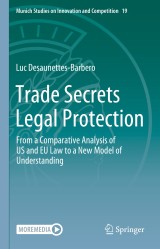Details

Trade Secrets Legal Protection
From a Comparative Analysis of US and EU Law to a New Model of UnderstandingMunich Studies on Innovation and Competition, Band 19
|
160,49 € |
|
| Verlag: | Springer |
| Format: | |
| Veröffentl.: | 10.06.2023 |
| ISBN/EAN: | 9783031267864 |
| Sprache: | englisch |
Dieses eBook enthält ein Wasserzeichen.
Beschreibungen
Despite the economic relevance of trade secrets, their legal protection is not based on a robust theoretical corpus, and a large uncertainty remains regarding how they should be legally apprehended. The present book investigates the foundations of their legal protection by assessing its justifications and aims to define how this legal apprehension should be organized.<div><br></div><div><div>The book starts with a comparative analysis of the US and the EU legal frameworks. It demonstrates the parentship existing between the two systems of protection and highlights that the incremental structuring of trade secrets protection has led to legal systems lacking broad-based conceptual foundations. In both legal orders, trade secrets rely on blurred protection, formally anchored in unfair competition, the strength of which, however, comes closer to that offered by intellectual property law. In this convoluted architecture, the judiciary is required to play a decisive role,especially at the enforcement stage. However, the absence of clarity concerning the telos of trade secrets protection leads to legal uncertainty, potentially incoherent enforcement, and, all in all, to inefficient outcomes from a welfare perspective.</div></div><div><br></div><div><div>The book then explores a theoretical framework based on a distinction between two legal objects: the undertakings’ secret sphere and secret pieces of information. Securing the undertakings’ secret sphere appears as a condition for the competition process to happen in an economy working under structural uncertainty. It requires objective regulations enforced by public authorities. On the other hand, the legal apprehension of secret pieces of information should be considered as falling within the realm of immaterial goods regulation aiming to solve the deficit of marketability of this type of good. This might call – after conducting a careful policy trade-off – for the establishment of relative (i.e. inter partes) subjective rights.</div></div>
Part I: Trade Secrets Legal Protection in the US and in the UE: AnAarea of Law in Search of Coherence.- Introduction to Part 1.- Premise – Intellectual Property and Unfair Competition: Two Regulatory Paradigms With Different Purposes and Apparatus.- Trade Secrets Subject Matter: A Broad and Blurred International Consensus.- Trade Secrets Legal Apprehension: An Uncertain Normative Framework.- Part II: Redefining Trade Secrets Law by Differentiating Between Two Different Legal Objects: The Secret Sphere and the Secret Pieces of Information.- Introduction to Part 2.- Premise – The Absence of Clear Theoretical Foundations.- The Legal Protection of Undertaking's Secret Sphere as a Necessity For The Functioning of the Market Economy.- The Legal Apprehension of Secret Pieces of Information as Immaterial Goods Regulation.- Conclusion – The Distinction between the Secret Sphere and Secret Pieces of Information: The Need of a New Conceptual Model for Trade Secrets Law.- Part 3 - Conclusion.- General Conclusion.- Part 4 Summaries.- German Summary.- French Summary.- Bibliography.<div><br></div>
Luc Desaunettes-Barbero is a legal post-doctoral researcher at the UClouvain (Belgique). His research focuses on the area of intellectual property (especially copyright, patent, geographical indications, trade secret law), competition and unfair competition law and he authored serval publications and monographs in these domains. <div>On top of his research agenda, Luc Desaunettes-Barbero is also a lecturer at the University Saint-Louis (Brussels), the University of Strasbourg and at the Munich Intellectual Property Law Center (Munich).</div>
Despite the economic relevance of trade secrets, their legal protection is not based on a robust theoretical corpus, and a large uncertainty remains regarding how they should be legally apprehended. The present book investigates the foundations of their legal protection by assessing its justifications and aims to define how this legal apprehension should be organized.<div><br></div><div>The book starts with a comparative analysis of the US and the EU legal frameworks. It demonstrates the parentship existing between the two systems of protection and highlights that the incremental structuring of trade secrets protection has led to legal systems lacking broad-based conceptual foundations. In both</div><div>legal orders, trade secrets rely on blurred protection, formally anchored in unfair competition, the strength of which, however, comes closer to that offered by intellectual property law. In this convoluted architecture, the judiciary is required to play a decisiverole, especially at the enforcement stage. However, the absence of</div><div>clarity concerning the telos of trade secrets protection leads to legal uncertainty, potentially incoherent enforcement, and, all in all, to inefficient outcomes from a welfare perspective.</div><div><br></div><div><div>The book then explores a theoretical framework based on a distinction between two legal objects: the undertakings’ secret sphere and secret pieces of information. Securing the undertakings’ secret sphere appears as a condition for the competition process to happen in an economy working under structural uncertainty.</div><div>It requires objective regulations enforced by public authorities. On the other hand, the legal apprehension of secret pieces of information should be considered as falling within the realm of immaterial goods regulation aiming to solve the deficit of marketability of this type of good. This might call – after conducting a careful policy</div><div>trade-off – for the establishment of relative (i.e. inter partes) subjective rights.</div></div>
Provides a comprehensive comparative analysis of the US and EU systems of trade secret legal protection Brings a new layer to the IP theory: the ‘relative’ exclusive rights Proposes a model based on two legal objects: the secret sphere and the protection of secret pieces of information

















